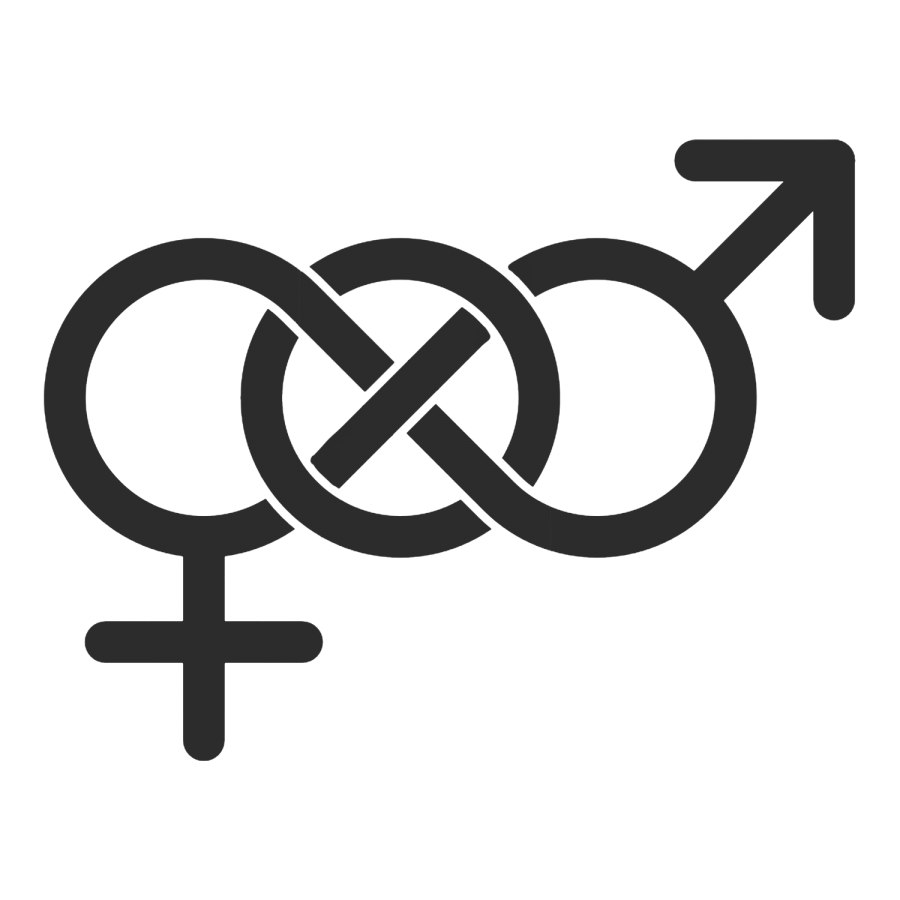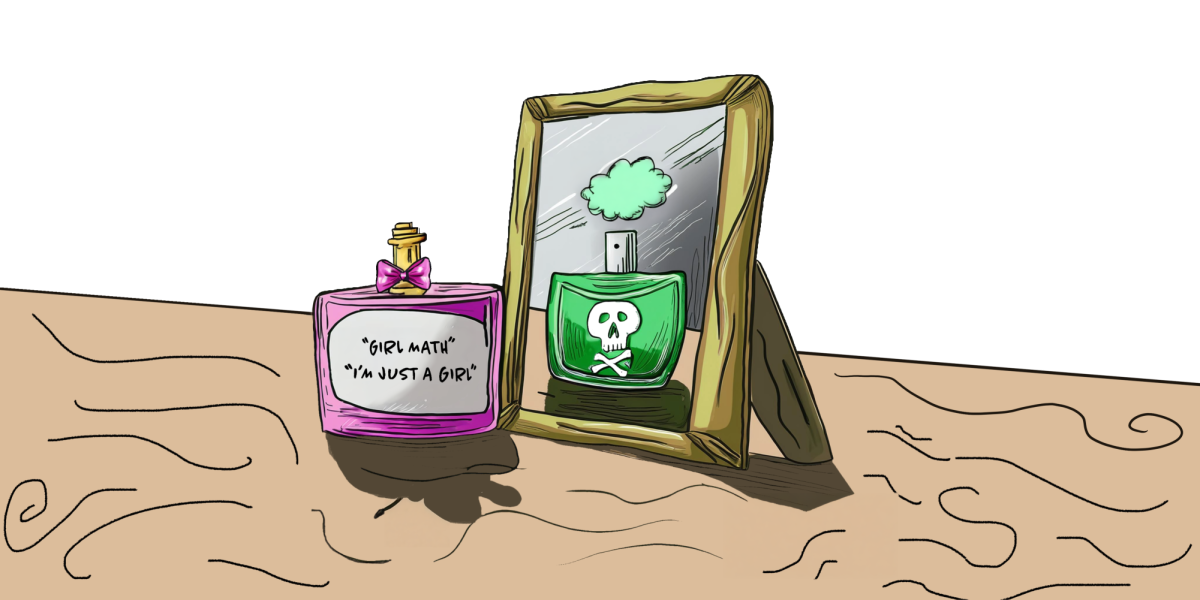Written by Katie Russell
Everyone should consider themselves feminists, and that statement should not be controversial. The definition of a feminist is someone who believes that men and women should be social, political and economic equals. This, at least to me, sounds reasonable enough, and the general public seems to agree; according to “The Huffington Post,” 82 percent of Americans believe men and women should be equal. However, only 20 percent of Americans consider themselves feminists. This discrepancy ultimately stems from a host of misconceptions about feminism and what it stands for, an issue that may only be combated by means of education and explanation.
The word “feminism” is often paired with the word “radical,” and tends to prompt eye-rolling and even outright displays of distaste. According to YouGov, 37 percent of Americans said that the word “feminist” has a negative connotation. A common criticism deals with semantics; if feminists fight for equal rights, opponents ask, then why not call it egalitarianism? Why “feminism”? To paraphrase from author Chimamanda Ngozi Adichie’s “We Should All Be Feminists”: to avoid the word feminism is to exclude and ignore the struggles and oppression women have faced for centuries.
Rather than simplistically placing both genders on the same level, feminism aims to empower and enable women to claim the institutional and interpersonal power men already command. Sexism undeniably disadvantages women in their careers, their financial independence, their physical safety and more; circumstances are dreadfully worse in non-western nations. Feminism’s negative connotation itself is proof that we are still far from realizing gender equality. A prevalent concern is the association with hate-mongering activists who also consider themselves feminists. As with any other social movement or group, extremists will demand attention, but those who call for the subjugation of men do not represent the vast majority of feminists. It is absurd to dismiss the ideas and beliefs of the whole simply because of a minority’s actions.
Similarly, an oft-cited misconception about feminism is that it somehow leaves men in the dust. According to “The Economist,” only 18 percent of American men consider themselves feminists. Regardless of whether the remaining majority are actively oppositional or apathetic, that shockingly low figure would certainly rise if misconceptions were corrected.
Contrary to popular belief, feminism benefits every gender. The field does not promote women or their rights over men; it strives for equality between genders. In this quest, feminists advocate the destruction of social constructs like gender roles. Discrimination and self-consciousness on the basis of gender still permeates everything from the television we watch to the majors we choose to pursue in college. Stringent masculine and feminine gender roles constrict freedom and opportunities for abso- lutely everyone, no matter the gender.
Feminism is within everyone’s best interest, and there is no good reason not to call oneself a feminist. Misconceptions should be resolved through open discourse; those who already support feminism should patiently educate. If we believe that men and women deserve equality in every way—and I hope we all do—then we should all consider ourselves feminists.











Anonymous • Dec 8, 2015 at 8:19 am
“Everyone should consider themselves feminists, and that statement should not be controversial. The definition of a feminist is someone who believes that men and women should be social, political and economic equals.”
Herein lies the problem with the entire article. The whole article is built off of this impractical and arrogant presumption. This first sentence holds that a specific ideology “should not be controversial”. If one were to replace the word “feminist” with any other ideology, be it “Christian” or “Democrat”, this article would be dismissed as politically charged and ignorant. However, because the presumption is that “feminism” is a naturally good force, it therefore “should not be controversial”.
There are two major issues to take with this. First, that feminism is a good force inherently because of its definition. The definition, while morally and socially rousing, is effectively a moot point in discussion of acceptance in a general populace. Understandably, the definition is the go-to for this article in order to deem feminism a good force, which should be universally accepted. However, the definition isn’t acceptable as an argument for the movement, since it is effectively an end goal, rather than the movement guidelines. Where you may decry those who don’t agree with modern feminism’s actions or leadership in first world countries as simply having “misconceptions”, the real issue lies within the arrogance with which you approach the issue. Instead of claiming that those who disagree with your movement are simply ill-educated or misunderstanding, it is far more constructive to listen to their points and begin discourse. Going in with a mindset of educating a child of an absolute only promotes more intolerance and repugnance towards the label of feminist. If a “feminist” came up to me (or wrote an article telling me how to identify myself) and expressly explained how my decision to not identify as a feminist was not only objectively wrong but also attempted to “educate” me as though I was missing some key piece of a puzzle in order to finally “get” feminism, I would probably be less receptive to discourse than before the interaction. This arrogance is exactly what turns people away from feminism, rather than to it. This isn’t math, there isn’t a time when you get to claim you have the right answer, the objectively clear path forwards. While feminism has a nice, tidy definition for you to cling to, so do many other organizations that don’t have this level of arrogance. Take, for example, Greenpeace. Their mission statement says: “Greenpeace is an independent campaigning organisation, which uses non-violent, creative confrontation to expose global environmental problems, and to force the solutions which are essential to a green and peaceful future.” Who could disagree with that? Only an ill-educated bigot who doesn’t understand climate change would be against Greenpeace right? Well, maybe if this “bigot” had seen that Greenpeace irreparably damaged the Peruvian Nazca lines, or that Greenpeace had lied about the amount of oil in the Brent Spar tanker, he would disagree. The point here being: you can name your organization or movement whatever you want, you can define it however you want, but at the end of the day, that definition is only as strong as your collective actions. I hope that the articles arrogance in this respect is clear then.
For the second issue, claiming that your ideology “should not be controversial” is eerily reminiscent of any fascist or totalitarian regime’s method of forcing ideology down throats of citizens. It maintains a sense that feminism needs no defense, no counter, because it is impeccable and perfect. It maintains that all opposition to feminism is uneducated and wrong. It shuts down all debate before it can start, which is the essence of fascism. I’m not stating that the article in any manner is fascist or has fascist leanings, but I do mean to say that it parallels a main attitude espoused by many fascist regimes, insofar that an idea, party, or political figure should “not be controversial”. In an attempt to further explain how you believe feminism is the way forward, you actually took a step back, regressing into an attitude that seeks to purport a single ideology as the truth, and dismiss all oppositional argument before it can be voiced. Where you state this single ideology as objective truth subject to no controversy or discourse, you run a dangerous course which serves only to further divide and harm along political lines.
All in all, I really get what you are saying with your ardent support of feminism. It’s brave and necessary to take a stand on these issues, and I believe that your voiced opinion warrants thought and discussion. It is, however, subject to the same scrutiny and criticism that you seek to absolve feminism of. If you truly wish to see the percentage of labeled feminists rise in the United States, I suggest you start by treating those who do not yet label themselves as such with respect and dignity–not condescension and arrogance.
Anon • Dec 4, 2015 at 10:49 pm
Cirsova, flaws in a movement shouldn’t stop you from supporting the entire movement. According to your justification, women of color, transgender women, intersex women, women of certain religions, elderly women, women in sex work, etc. would all have reason to abandon and defame feminism. Yet these voices are actually the ones necessary to diversify and equalize the ongoing discussions and actions…. In addition, as a male feminist, I feel your primary method of support is uplifting the voices of women who feel victimized and oppressed.
Cirsova • Dec 5, 2015 at 5:45 pm
They absolutely do because feminism is destructive to the liberty of all women.
Alice • Dec 8, 2015 at 2:53 am
I’m sorry you think that… I’m a feminist and I have never told another woman to act one way or another… I will support every woman’s decision to do whatever she wants with her body, for example and I’m really confused as to why you characterize “90{74e2084e47f46e06e62dbba283cef78e0e039417a59d0bb63ac31908f44b1eca} of feminism” as such when all my feminist friends and I respect every ones decisions.. We are trying to destroy those “values” women are “supposed” to act by, that’s part of the point of feminism (which adds to my confusion about your statement).. As for the 10{74e2084e47f46e06e62dbba283cef78e0e039417a59d0bb63ac31908f44b1eca} part you’re describing only some women that take the word feminism too far and (these women are actually the reason why there are so many misconceptions about feminism) and hate all men. Anyway.. I really hope you change your mind about being a feminist because it’s really not about that.. I support whatever both men and women want to do, no matter what values they’re destroying.
Cirsova • Dec 8, 2015 at 2:33 pm
One of the biggest problems is that feminism is a giant Scotland filled with no-true-Scotsmen strawmanning one another (the 2nd and 3rd waves, the sex negative and sex positive, those who believe in patriarchal conspiracy and those who don’t, the trans-inclusive and trans-opposed, etc.). There are still several feminists that I hold respect for, but when you have a movement filled with Dworkins, Solanases, Theriaults and Alexanders who make all sorts of ridiculous proclaimations about men and women then accuse women who disagree with them of ‘internalized misogyny’, you end up with a hostile and fragmented ideology that is fighting within itself and often attacking those it claims to be fighting for. I actually used to believe that feminism was about fighting for the equality of women, but what I would constantly see is attacks on and shaming of women (even within the feminist community; I mean, look at what they say about Camille Paglia!) who did not conform to this or that idea of what a woman is or should be. It’s exchanging one set of fetters for another.
Male feminism is even worse, because it is MEN telling women who disagree with ideological feminism that they’re wrong and need to behave a certain way and are willing to shame them for not doing so!
The “Equality” aspect of feminism is admirable, but few feminists I’ve seen actually hold that belief (and the academic feminists who hold that belief and the choice feminists get the nastiest stuff said about them by their fellow feminists), but the ones who do not use it as a shield from criticism; I mean, who would want to oppose equality? #killallmen
The reason I no longer call myself a feminist is because I’ve seen how modern feminism strips agency from women and reduces them to a state of perpetual victimhood -they NEED feminism and can’t get along without it, even if they thought they were doing just fine; and when those women still think they don’t need feminism or if they are happy with traditional gender roles, I’ve seen the long-knives come out.
There would need to be a massive sea-change in mainstream feminism to bring me back into the fold.
Cirsova • Dec 4, 2015 at 7:49 pm
I stopped being a male feminist when I realized that 90{74e2084e47f46e06e62dbba283cef78e0e039417a59d0bb63ac31908f44b1eca} of feminism is telling women that they’re being women wrong and need to be shamed into not doing certain things or hold certain values. The other 10{74e2084e47f46e06e62dbba283cef78e0e039417a59d0bb63ac31908f44b1eca} is trying to scare women into thinking that strawmen are out to keep them down and perpetually victimize them.